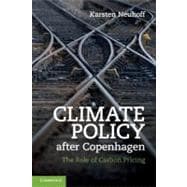
Note: Supplemental materials are not guaranteed with Rental or Used book purchases.
Purchase Benefits
What is included with this book?
| List of figures | p. ix |
| List of tables | p. xii |
| List of boxes | p. xiii |
| Acknowledgements | p. xiv |
| List of abbreviations | p. xv |
| Introduction | p. 1 |
| The role of a climate policy mix | p. 19 |
| Putting a price on carbon | p. 20 |
| The role of technology policy | p. 29 |
| The role for targeted measures and regulation | p. 41 |
| Managing distributional implications | p. 45 |
| Conclusion | p. 52 |
| Implementing a carbon price: the example of cap and trade | p. 56 |
| The SO ub>2 trading programme in the USA | p. 58 |
| The European Union emissions-trading scheme | p. 61 |
| Setting the cap: too many cooks spoil the broth | p. 65 |
| Distributing allowances: compensate or distort | p. 72 |
| Sectoral coverage of a carbon-pricing scheme | p. 86 |
| Conclusion | p. 93 |
| Shifting investment to low-carbon choices | p. 97 |
| The nature of uncertainty | p. 98 |
| Response to uncertainty with taxes and cap-and-trade schemes | p. 100 |
| Investment under uncertainty: contrasting different perspectives | p. 105 |
| Addressing requirements of strategic investors | p. 109 |
| Addressing requirements of project investors | p. 115 |
| Addressing the needs of financial investors | p. 125 |
| Conclusion | p. 129 |
| Co-operation among developed countries: a role for carbon markets? | p. 132 |
| Using international co-operation to enhance domestic commitment | p. 133 |
| Transparent monitoring and reporting | p. 140 |
| Carbon-market-based international co-operation among developed countries | p. 143 |
| The economics of carbon-market-based co-operation mechanisms | p. 148 |
| The political economy of carbon-market-based instruments | p. 151 |
| A global carbon tax | p. 155 |
| Conclusion | p. 158 |
| A world of different carbon prices | p. 162 |
| Screening for high carbon costs | p. 164 |
| Do international cost differences matter? Dimensions of trade | p. 173 |
| Corporate strategy: the longer-term view | p. 178 |
| The industry value chain: leakage versus substitution effect | p. 181 |
| Policy options to address leakage | p. 185 |
| Conclusion | p. 198 |
| International support for low-carbon growth in developing countries | p. 203 |
| Framework for international co-operation | p. 206 |
| Financial needs for low-carbon development | p. 210 |
| The role of carbon markets to provide support for developing countries | p. 220 |
| Conclusion | p. 234 |
| Conclusion | p. 237 |
| References | p. 248 |
| Index | p. 264 |
| Table of Contents provided by Ingram. All Rights Reserved. |
The New copy of this book will include any supplemental materials advertised. Please check the title of the book to determine if it should include any access cards, study guides, lab manuals, CDs, etc.
The Used, Rental and eBook copies of this book are not guaranteed to include any supplemental materials. Typically, only the book itself is included. This is true even if the title states it includes any access cards, study guides, lab manuals, CDs, etc.